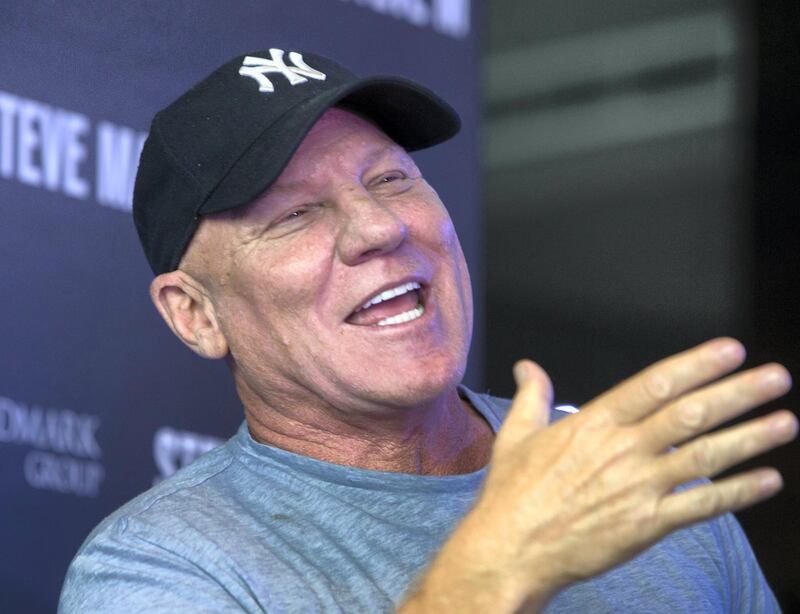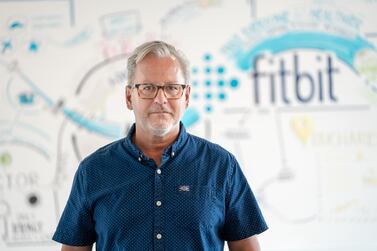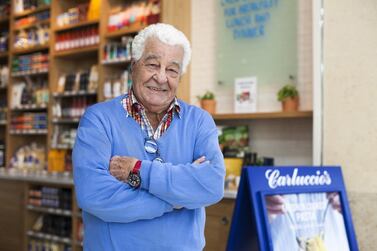Steve Madden, founder and design chief of the namesake US shoe empire, says his brand has only “halfway penetrated the Middle East” and sees opportunity for more growth in the region.
“The Middle East is very important,” said Mr Madden in Dubai at an event to celebrate the brand’s 30th anniversary. “There are parts of the Middle East that we have not penetrated.”
There are 40 Steve Madden stores in the GCC, including 18 in the UAE, 11 in Saudi Arabia, and two to three in each of the other countries in the Gulf. There are plans to open 12 more in the coming year through the brand’s franchise operator Landmark Group.
"The bulk of the growth is going to be coming in Saudi Arabia," Dinesh Shahani, chief operating officer of Landmark Group's Shoemart International, told The National. "The upside potential is to add 20 stores over the next two, three years there."
There are a total of 227 Steve Madden retail stores, including eight online stores, in the US and internationally.
Mr Madden founded the footwear brand in New York in 1990 with an investment of $1,100 (Dh4,440), selling shoes from the boot of his car. Three years later, his company opened its first store and became a publicly traded company on the Nasdaq.
Despite Mr Madden serving a 30-month stint in prison in 2002 for stock manipulation and securities fraud and being forced to resign as chief executive, the company has grown exponentially since then – with $1.65 billion in net sales last year.
Now there are new challenges – including the effect of China tariffs and a need to adapt to a changing retail environment due to e-commerce.
“Right now we have a supply chain challenge,” Mr Madden said at the event in Dubai Mall on Sunday. “We make shoes all over the world – we make shoes in Europe, Mexico, Brazil but we make a lot of shoes in China.”
About 85 per cent of the company's shoes are produced in China, a number it hopes to shrink to the 60s, according to its third quarter earnings call last month.
Chief executive Edward Rosenfeld said then that tariffs have resulted in the retailer moving production out of China, working with suppliers to gain price concessions and having to raise selling prices. For consumers, that means higher prices for footwear in the “mid-single digits on average going into spring”, Mr Rosenfeld said.
The US-China trade war has been roiling the global economy since July 2018, when US President Donald Trump started setting tariffs and China did the same. This month both sides said tariffs could be rolled back in phases, but Mr Trump said nothing concrete was agreed so far.
Steve Madden estimates a negative impact of $0.02 per share due to Mr Trump’s fourth set of tariffs, in addition to the $0.05 per share loss from the third set of tariffs that the company had previously announced. The first round took effect in September, hitting $112bn worth of goods with a 15 per cent levy, while duties on the remaining $188bn are scheduled for mid-December.
Mr Madden has been an outspoken critic of the effect of tariffs on retailers, but is hopeful about progress in US-China trade talks.
“It seems like it’s moving in the right direction. Look, we’re a big company, we make shoes all over the world. It impacted us, but we’ve adapted,” Mr Madden said. “I’m still not happy about it.”
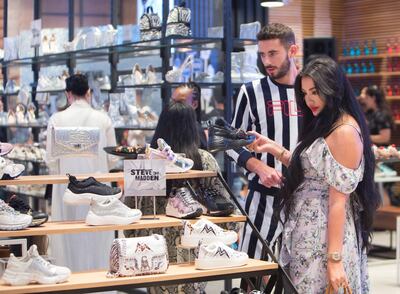
As for the effect of e-commerce, the brand's biggest store worldwide at 370 square metres in the Dubai Mall is proof that "we still think stores are important", Mr Madden said.
“But certainly, people are shopping from their phones,” he said. “What you have to be clever about is how stores look in the future, how you truly become omni-channel, which is something we’re working on.”
Mr Shahani of Landmark Group said the average Steve Madden store in the region was 110 to 120 square metres, but the new ones will all be more than 185 square metres.
“You have to be careful. You can’t just open stores blindly anywhere,” Mr Shahani said. “There will be a tendency to open fewer stores, but bigger and better stores – stores that offer a better experience.”
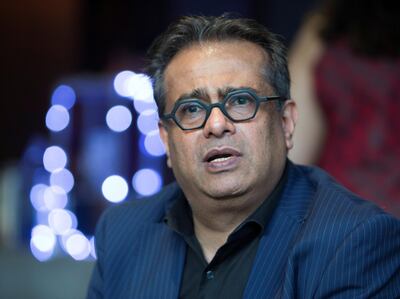
Steve Madden is the fastest growing brand in the franchise portfolio of Landmark, which operates more than 2,300 outlets in the Middle East and Indian subcontinent. It has more than 50 brands, including its own brands Home Centre, Baby Shop and Centrepoint, while its seven franchise footwear brands include Ecco, Kurt Geiger, Pablosky and Stride Rite.
Mr Shahani said Steve Madden has seen growth in the region over the past couple of years due to more of a “customised reach” to the local market.
“Because they are a wholesaler as well, not just a retailer, their range is extremely large and they’re able to customise many products for the region that other brands don’t do,” he said. “For example, there weren’t a lot of men’s sandals in the business two years back and we [now] have a huge line of men’s sandals.”
The biggest growth potential is in Saudi Arabia, where a wave of reforms in line with its Vision 2030 have opened up the market. In recent months, the kingdom has removed the ban on women driving, invested in large infrastructure projects to diversify away from oil and introduced new tourist visas.
“Everybody’s seen sizeable growth in Saudi [during] the last six to nine months with all the reforms happening,” Mr Shahani said. “The GCC market was in decline in 2016 and 2017, and we’ve seen a huge bounce back in Saudi Arabia.”
Mr Madden, too, is optimistic about the region. Commenting on the highlight of his career, he said “my first store was great, but coming to Dubai – seeing this miracle here – it really is a highlight”.
